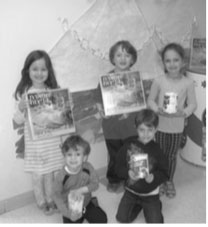“The Genius Under the Table” transports readers back to 1970s Leningrad through the imaginative and humorous perspective of a young Eugene Yelchin. Though intended for middle-grade readers, this memoir, woven with illustrations, appeals to all ages by providing a glimpse into the reality of life in the Soviet Union.
Yelchin’s talent for storytelling shines through from the very first pages. With wit and insight unusual for a child, his gaze fixes on a bandage on Lenin’s neck during a school trip to visit the leader’s mummified remains. This kicks off a coming-of-age story marked by equal parts hilarity and hardship. Four families crammed into a tiny apartment, a mother longing for her aborted ballet career, a father aspiring to be a published poet even as he supports the household as a truck driver — all are seen through the lens of a boy determined to find his place.
Sleeping nightly underneath the family dining room table with a stolen pencil and sheet of paper, Yelchin sketches a world far different from his own in his secret drawings. He depicts his older brother as a champion figure skater amidst the backdrop of Moscow’s crowded ice rinks rather than the reluctant boxing competitor parentally ordained. Each evening, the boy awaits his father’s inevitable diatribe over the missing writing implements while his creator’s spirit grows.
Beyond the more lighthearted escapades of childhood, a more profound meditation on finding one’s calling emerges. The father’s discouragement of his younger son’s creative pursuits intensifies, even as he wishes for the boy to attain the apartment and car that eluded him. This thoughtful exploration of the tensions between pragmatic responsibility and passionate aspiration makes the book worthy of discussion from tweens and grandparents alike.
An eventual encounter with Mikael Baryshnikov spotlighted on Russian nightly news highlights the stark contrast between the easy freedom of the West and the Soviet’s regimental rule. When Baryshnikov later defected during a Canadian tour, the event was embedded in Yelchin’s mind as inspiration and warning — tales of punishment for subversion lurk as a common urban legend.
Yelchin’s descriptive capabilities enchant, from sensory details like stale cigarette smoke perpetually clinging to his father’s beard, to insightful observations others overlook, like noting that the occupation of a street sweeper seems imbued with purpose and dignity despite low social status. Throughout the book, moments of humor shine, like his childish matter-of-fact declaration that his parents chose to sleep in the living room because they snore too loudly.
The muted color palette of the accompanying illustrations captures the dull concrete aesthetic of Soviet architecture in Yelchin’s home city. This bleakness haunts the story even during more lighthearted moments spent on school field trips and adventures with friends. The contrast between the drab streets the young Yelchin inhabits and the graceful ice dancers he depicts in secret doodles heightens a central tension. It elegantly asks whether the creative spirit can survive — even thrive — no matter the circumstances.
Yelchin’s memoir meets at the crossroads between childhood memories, biting cultural commentary, and an artist’s maturation. Literature illuminates shared human experiences and struggles. “The Genius Under the Table” triumphs in this worthy goal. Readers glimpse life behind the Iron Curtain, but perhaps more universally, the perpetual human drive for self-expression and meaning buttressed by an unconquerable imagination against all odds.





